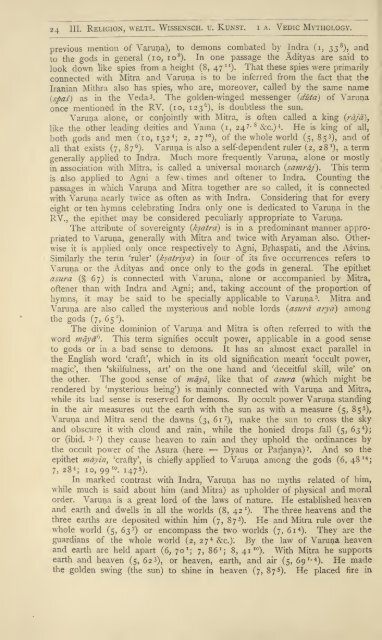You also want an ePaper? Increase the reach of your titles
YUMPU automatically turns print PDFs into web optimized ePapers that Google loves.
24 HI. RELIGION, WELTL. WISSENSCH. u. KUNST. i A. VEDIC MYTHOLOGY.<br />
previous mention of Varuna), to demons combated by Indra (i, 33 8<br />
), and<br />
io 8<br />
). In one passage the Adityas are said to<br />
to the gods in general (io,<br />
IX<br />
look down like spies from a height (8, 47 ). That these spies were primarily<br />
connected with Mitra and Varuna is to be inferred from the fact that the<br />
Iranian Mithra also has spies, who are, moreover, called by the same name<br />
(spas) as in the Veda 3. The golden-winged messenger (dutd)<br />
6<br />
once mentioned in the RV. (io, I23 ),<br />
is doubtless the sun.<br />
of Varuna<br />
Varuna alone, or conjointly with Mitra, is often called a king<br />
8<br />
like the other leading deities and Yama (i, 247- &c.)<br />
(rdjd),<br />
4 . He is king<br />
both gods<br />
of all,<br />
and men do, I32 4 ; 2, 27 10<br />
), of the whole world (5, 85^),<br />
6<br />
all that exists (7, 87 ). Varuna is also a self-dependent ruler (2, 28<br />
and of<br />
J<br />
), a term<br />
generally applied to Indra. Much more frequently Varuna, alone or mostly<br />
in association with Mitra, is called a universal monarch (samrdj). This term<br />
is also applied to Agni a few times and oftener to Indra. Counting the<br />
passages in which Varuna and Mitra together are so called, it is connected<br />
with Varuna nearly twice as often as with Indra. Considering that for every<br />
eight or ten hymns celebrating Indra only one is dedicated to Varuna in the<br />
RV., the epithet may be considered peculiarly appropriate to Varuna.<br />
The attribute of sovereignty (ksatra] is in a predominant manner appro<br />
priated to Varuna, generally with Mitra and twice with Aryaman also. Other<br />
wise it is applied only once respectively to Agni, Brhaspati, and the Asvins.<br />
Similarly the term ruler (ksatriyd)<br />
in four of its five occurrences refers to<br />
Varuna or the Adityas and once only to the gods in general. The epithet<br />
asura ( 67) is connected with Varuna, alone or accompanied by Mitra,<br />
oftener than with Indra and Agni; and, taking account of the proportion of<br />
hymns, it may be said to be specially applicable to Varuna 5 . Mitra and<br />
Varuna are also called the mysterious and noble lords (asurd arya) among<br />
the gods (7, 65 2<br />
).<br />
The divine dominion of Varuna and Mitra is often referred to with the<br />
word mdyd 6 . This term signifies occult power, applicable in a good sense<br />
to gods or in a bad sense to demons. It has an almost exact parallel in<br />
the English word craft*, which in its old signification meant occult power,<br />
magic , then skilfulness, art on the one hand and deceitful skill, wile on<br />
the other. The good sense of mdyd, like that of asura (which might be<br />
rendered by mysterious being ) is mainly connected with Varuna and Mitra,<br />
while its bad sense is reserved for demons. By occult power Varuna standing<br />
in the air measures out the earth with the<br />
Varuna and Mitra send the dawns (3, 6i<br />
sun as with a measure 5<br />
(5, 85 ),<br />
7<br />
), make the sun to cross the sky<br />
and obscure it with cloud and rain, while the honied drops fall (5,<br />
4<br />
63 );<br />
or (ibid. 3 - 7<br />
) they cause heaven to rain and they uphold the ordinances by<br />
the occult power of the Asura (here = Dyaus or Parjanya)?. And so the<br />
epithet mdyin, crafty , is chiefly applied to Varuna among the gods (6, 48 I4 ;<br />
7, 284; io, 99 I0 . i 47 5).<br />
In marked contrast with Indra, Varuna has no myths related of him,<br />
and moral<br />
while much is said about him (and Mitra) as upholder of physical<br />
order. Varuna is a great lord of the laws of nature. He established heaven<br />
and earth and dwells in all the worlds (8, 42 ). The three heavens and the<br />
three earths are 5<br />
deposited within him (7, 87 ). He and Mitra rule over the<br />
whole world 7<br />
(5, 63 ) or encompass the two worlds (7, 6i 4 ). They are the<br />
guardians of the whole world 4<br />
. (2, 27 &c.) By the law of Varuna heaven<br />
and 10<br />
earth are held apart (6, 70 ; 7, 86 *; 8, 41 ). With Mitra he supports<br />
T - earth and heaven (5, 62 3), or heaven, earth, and air 4<br />
(5, 69 ). He made<br />
the golden swing (the sun) to shine in heaven (7, 875). He placed fire in

















